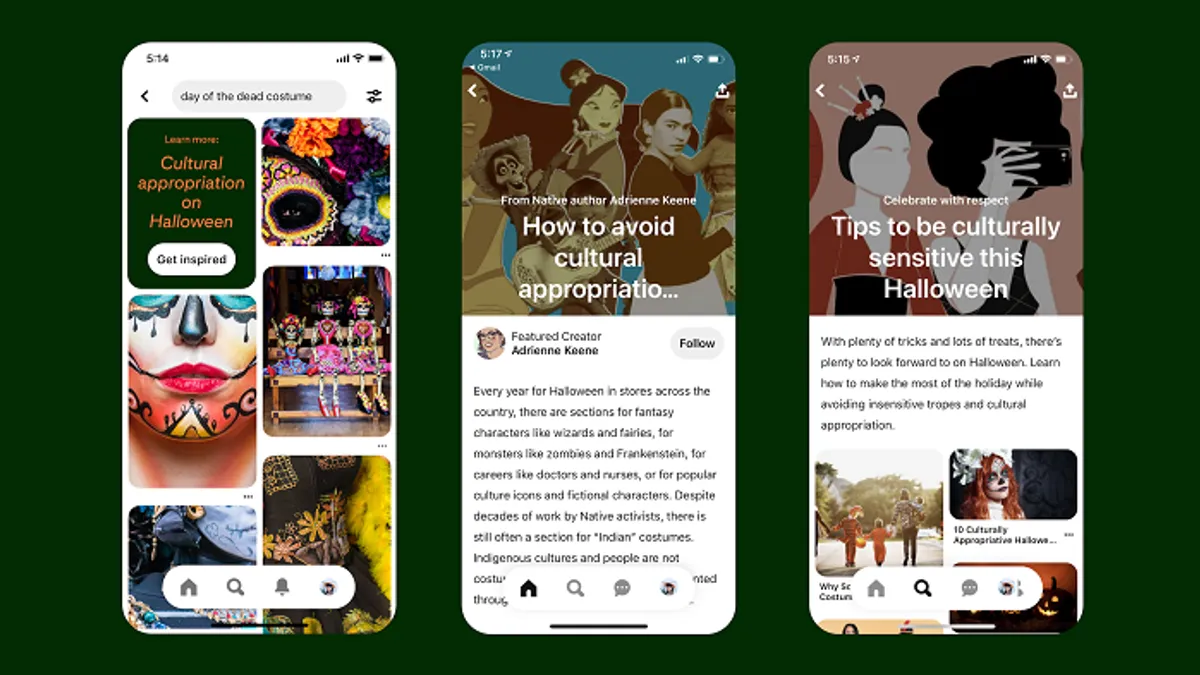Brief:
- Pinterest announced a plan to make its digital pinboards more brand-safe this Halloween by featuring information on how to be more culturally sensitive when choosing a costume. When Pinterest users browse ideas for Halloween costumes, they will see a post at the top of search results with more information about how to celebrate the occasion "thoughtfully and respectfully," according to an announcement.
- That post will have links to information picked by Pinterest's PIndigenous employee group and experts such as Adrienne Keene, a Native American academic, writer and activist who teaches at Brown University. Recommendations for costumes that appropriate cultures will be limited in notifications and email.
- Pinterest in 2016 started prohibiting advertisements with culturally inappropriate costumes, letting users report culturally insensitive content in Pins, as its posts are called. The latest move now comes as Pinterest sees heightened interest in Halloween this year, with searches for "Halloween costumes with masks" rising 27-fold and "Halloween games" up 10 times from last year, per its announcement.
Insight:
Pinterest's steps to educate consumers about possibly offensive Halloween costumes can help to make its platform safer for brands that don't want their ads and posts showing up next to culturally insensitive content. Amid heightened awareness about racism and cultural appropriation, especially among Gen Zers who are more racially and ethnically diverse than older demographic groups, Pinterest is looking to take a stand and stomp out this type of content on its platform. The move may simultaneously position Pinterest as a more progressive and appealing social channel for users, while ensuring marketers a brand-safe space to advertise.
"We believe that positive context matters for consumers and brands, particularly right now, and these ongoing efforts cultivate a safe and positive environment on Pinterest," Jon Kaplan, Pinterest head of global sales, said in a statement emailed to Mobile Marketer. "Our insights show that despite the pandemic, Pinners are still preparing for Halloween, and brands have an opportunity to create meaningful connections that will inspire their audiences."
He cited findings from a recent study showing that six out of 10 adults were more likely to remember brands they saw online while feeling positive.
Pinterest's effort to highlight cultural sensitivities and make its platform safer for brands follows other steps to provide a positive user experience while being socially conscious. Amid the onset of the coronavirus pandemic, the company in March added "compassionate search" to its website, offering a mental wellness feature that was first introduced on its app. The feature helps to find activities for emotional well-being when people search for terms like "stress relief." Last year, the company cut the volume of self-harm content while offering resources to prevent suicide as part of its ongoing effort to improve public health.
Amid these efforts, Pinterest has faced numerous accusations of gender bias and workplace discrimination, The Verge reported in September. Former COO Françoise Brougher in August sued the company for firing her after she complained about sexist treatment, which she described in a blog post. A Pinterest spokesperson said the company was reviewing the lawsuit, The New York Times reported. The allegations against the company may negatively affect perceptions about the sincerity of its ongoing inclusivity efforts.














